We’ve all been there. Something has embedded itself into our brains and we can’t stop thinking about it. Ruminating, or overthinking, is a common behavior that most people can relate to on some level.
Whether it’s something someone said, something you did, rehashing the past, or worrying about the future, it’s monopolizing your thoughts, and it can become a real problem. At the very least, it can be annoying, undermine your confidence, and prevent you from taking action.
Overthinking can be exhausting, and wastes time and energy, with no practical end result. Overthinking something isn’t going to help the problem. It’s just going to stop you from using the present moment for something more constructive.
So what do you do when you find yourself stuck in the loop of overthinking? Here are 7 tiny habits that will help you break the cycle and begin to think more clearly again.
Habit #1: Daily Journaling
Start your day with 5 minutes each day, writing down what you’re thinking about.
Getting it out of your head and down on paper is one way to help you stop overthinking about something. Once you see it in writing, you may be able to let it go altogether, or find a new perspective that helps you view it in a more constructive way.
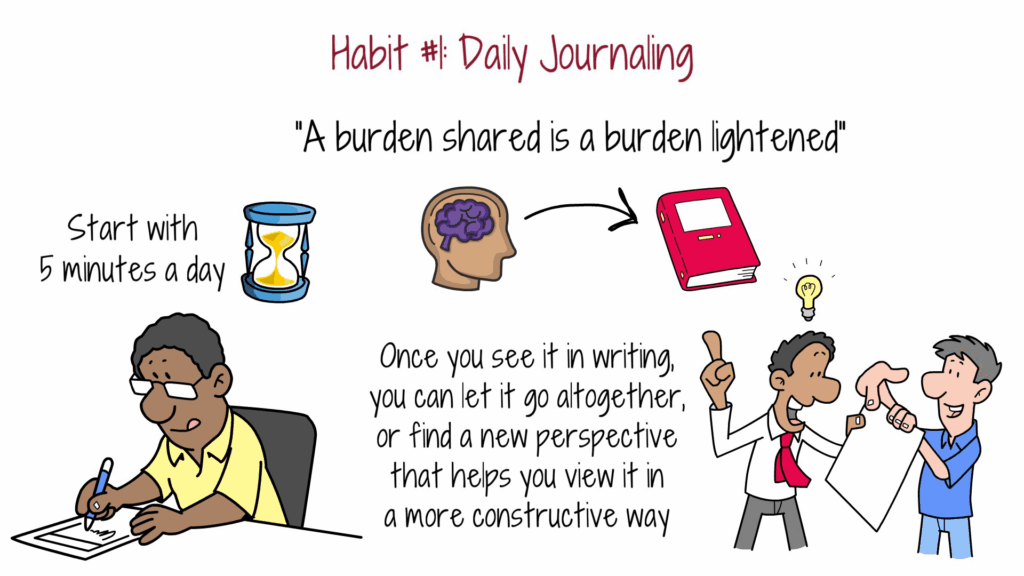
There is a common saying, “A burden shared is a burden lightened”, and that counts even if you’re just sharing it with your journal. So putting your thoughts down on paper can often help stop the pattern of overthinking something.
Habit #2: Breathe and Be Present
It can be difficult to empty your head of those ruminating thoughts and bring your attention back to the present moment. But breathing is one way to calm your mind and help you let go.
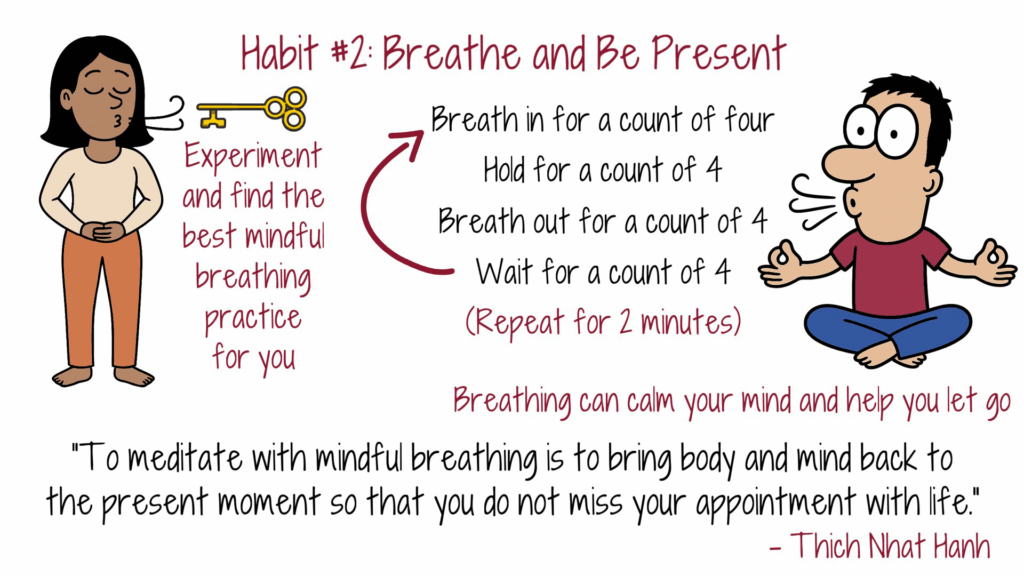
One example is the practice of breathing in through your nose for a count of four, holding your breath for a count of 4, breathing out through your mouth for a count of 4, and then waiting for a count of 4 before repeating the cycle again. Repeat for 2 minutes and focus on how the air feels as it moves through you. Other forms of mindful breathing practices have different ways of counting your breath that are equally helpful. Finding the one that feels right for you is the key.
If you’re overthinking something, you may be unable to focus on a lot of other things that need your attention.
Author Thich Nhat Hanh wrote,
“To meditate with mindful breathing is to bring body and mind back to the present moment so that you do not miss your appointment with life.”
Habit #3: Spend 30 Minutes of Tech-Free Time
Technology can be one way our brains are triggered to overthink something. Taking a break from your phone or laptop can help shut down the cycle of stuck thoughts. Get off your phone. Stop engaging in social media or random internet browsing for 30 minutes and do something else.
Choose a totally different activity. For example, draw or read. Show your brain that there’s life outside of your head.
Habit #4: Get Physical
If you need even more activity, try getting some exercise. Go for a walk, spend time in nature, or put on your favorite music and dance! Moving your body engages your brain in a way that can help you disconnect from overthinking and focus on something outside of yourself.
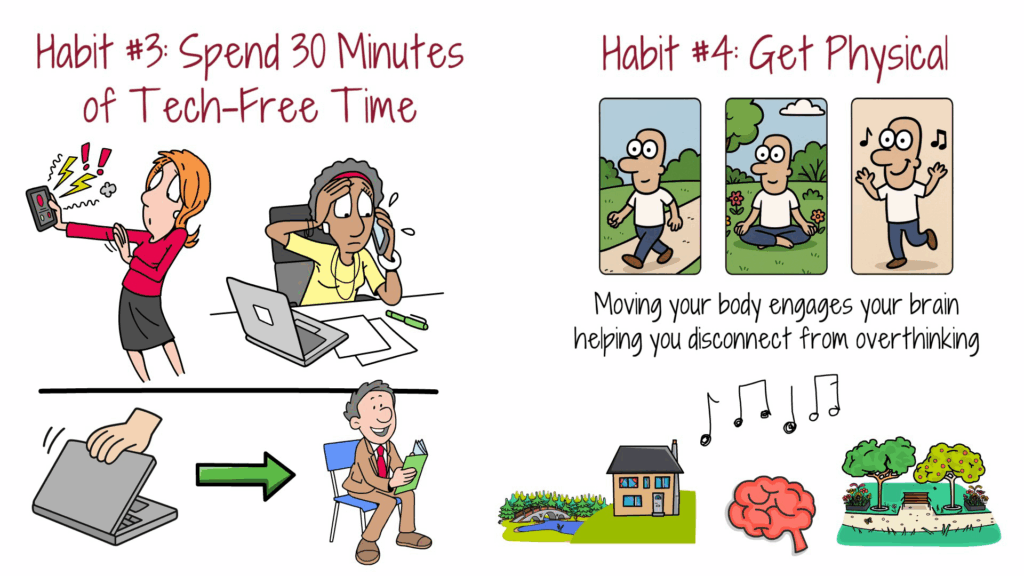
Let your body and senses observe different sights and sounds. Notice your surroundings. Occupy your thinking brain with the environment by seeing how many colors you can count, what kind of trees or flowers are there? What sounds do you hear?
When you bring attention to other things, your brain will follow your lead.
Habit #5: Train Your Brain
Another way to stop overthinking is to catch yourself in the act and recognize what you’re doing. By acknowledging the thoughts, you can learn to train your brain to stop the habit of overthinking things.
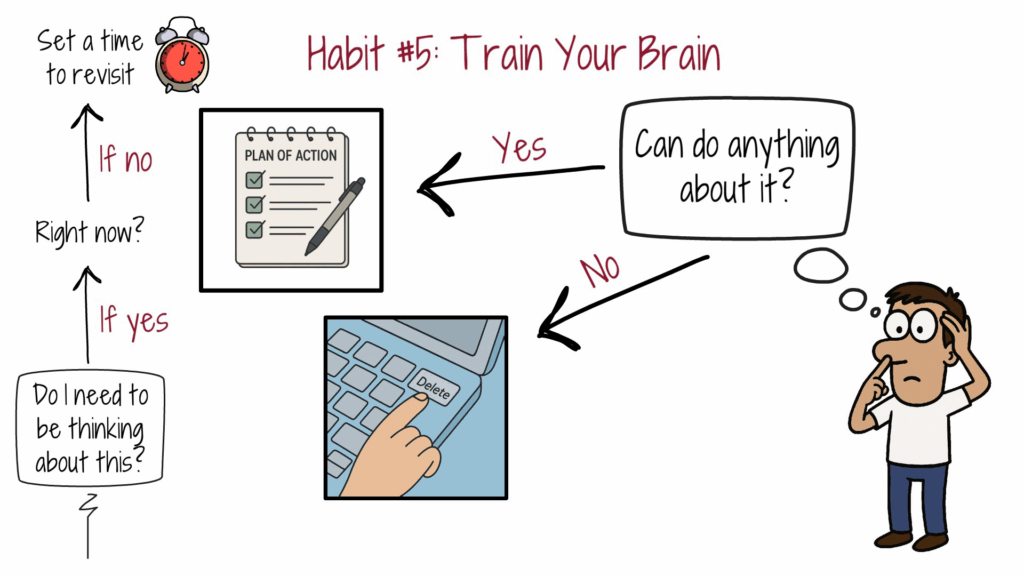
First, ask yourself if what you’re thinking about is something you can do anything about. If it’s out of your control, delete it and accept the facts. If it is something you can control, then take steps to remedy the situation by writing it down and making a realistic plan of action. Then move on.
Another question to ask yourself could be, “Do I need to be thinking about this?” Well, maybe! It might be important. It might be something you need to give more consideration to. But then you can ask yourself, “Do I need to be thinking about this right now?” If not, then set a time to revisit this topic when it’s more convenient for you.
Assign yourself a “worry time”, and tell yourself you will think about this thing at a particular time for a specific amount of time, when you can give it your full attention. Spend some time worrying about what’s bothering you. And when the time is up, you have to do something else.
By training your brain in such a way that YOU decide when you want to think about something, you can gain the upper hand on your uncontrolled thinking.
Some ruminating thoughts are just repetitive angst. After having put some time in between the initial overthinking and the assigned “worry time”, you may be able to rationalize your thoughts by asking the questions, “Is it true? Is it kind? Is it necessary?”
“I’ve had a lot of worries in my life, most of which never happened.”
– Mark Twain
Habit #6: Focus on Gratitude
When you notice your brain starting to spiral into overthinking, STOP!
Look around you and start naming things you’re grateful for. It can be something as simple as the chair you’re sitting in, the clothes you’re wearing or the nice lunch you just ate.
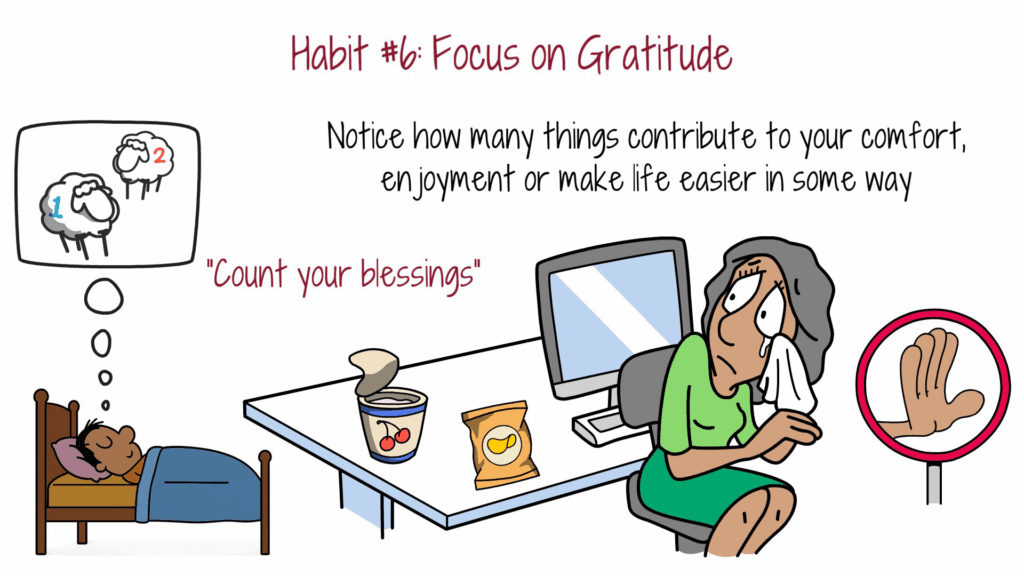
When you start noticing how many things contribute to your comfort, enjoyment or make life easier in some way, you might be surprised at how many things you can name.
This is kind of like counting sheep when you’re trying to get to sleep. When you start occupying your thinking with something else, like “counting your blessings”, you can change your focus rather quickly.
You can’t be upset and grateful at the same time.
Habit #7: Develop Regular Daily Affirmations
Stop your uncontrolled thinking by promoting positive self talk. One psychological technique to stop negative thinking is known as the SOS technique, which stands for “Stop”, “Observe”, and “Shift”.
- Stop! This is your chance to stop thinking and prepare to make another choice.
- Observe! Listen to what your words are saying to you and how it makes you feel.
- Shift! Now make a different choice and change what you’re thinking.
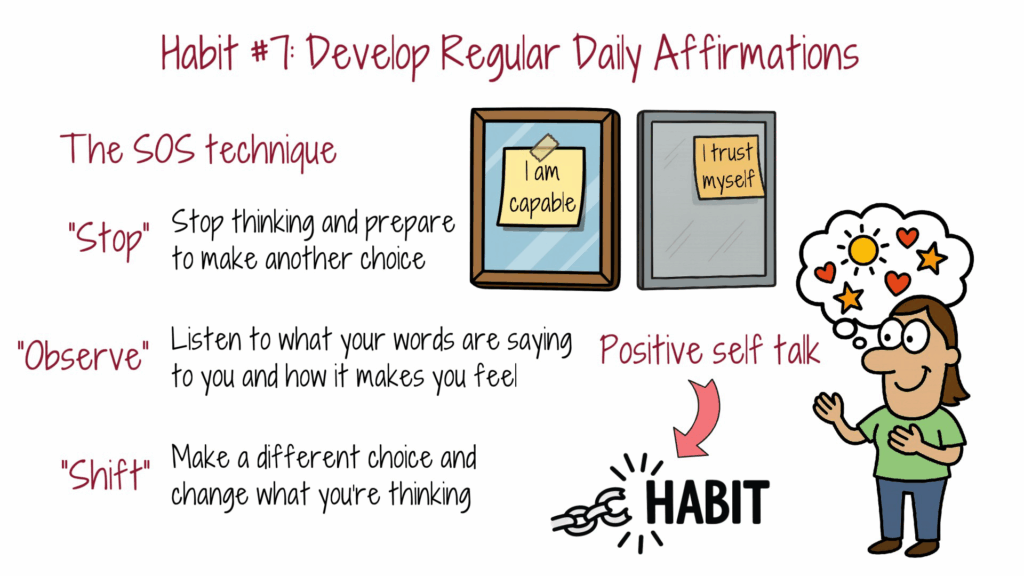
By stopping the initial cycle of overthinking, you give yourself a chance to break the habit.
Write down some affirmations and stick them in places you look at often. Have a daily mantra you can say to yourself whenever you want to shift your thinking to something else.
For example, “I am capable of handling whatever comes my way”, or “I trust myself to make good decisions”, are two affirmations you can use to stop overthinking.
When you replace uncontrolled thinking with conscious statements, you can take back control of your overthinking brain.
Final Thoughts
Our brains are wired to remind us of our mistakes, concerns or things that may need our attention.
For example, you’ll take many steps throughout the day and most of the time you won’t think much about the steps you’re taking. You won’t be actively telling one foot to move and then the other. But if you tripped going into a roomful of people, your mind will remember it. You may not remember any other step you took that day. But you’ll definitely remember that one!
Our brains do this in some regard, to protect us from it happening again. Which is fine, because we should be aware of anything that we don’t want to repeat. But the problem starts when you can’t let it go and begin to create a story around the event, and pretty soon it’s overwhelming.
Overthinking is a product of desires, mistakes, and worry. Catch it before it has a chance to explode out of control and train yourself using a few tiny habits to manage your thoughts.
